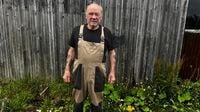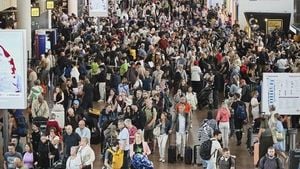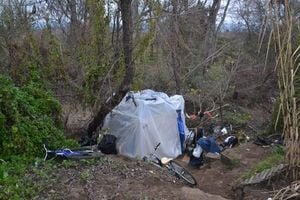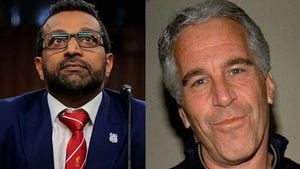President Donald Trump’s recent visit to Scotland has stirred a complex mix of business, politics, and public outcry, highlighting the deep divisions his presence continues to provoke in the country of his maternal heritage. Arriving on July 25, 2025, Trump’s trip combined rounds of golf at his luxury resorts with high-stakes trade negotiations and a ribbon-cutting ceremony, all shadowed by protests and local grievances.
Trump’s itinerary included play at his Turnberry golf course on Scotland’s west coast, a property the Trump family’s company acquired in 2014. Joined by his son Eric and U.S. Ambassador Warren Stephens, the president completed an 18-hole round despite showery weather, donning a black outfit and a white “USA” cap. Turnberry, a historic course, has long been a centerpiece of Trump’s Scottish ventures and a stage for his business and political ambitions. The family also planned to inaugurate a second 18-hole course at Trump International Scotland near Aberdeen, named the MacLeod Course in honor of Trump’s late mother, Mary Anne MacLeod, who was born on the Isle of Lewis.
Yet, beneath the manicured greens and fairways lies a simmering tension. Scotland’s public opinion of Trump remains overwhelmingly unfavorable, with recent polls indicating that 70% of Scots view him negatively, a figure higher than the 57% unfavorable rating across the United Kingdom. This sentiment was palpable in protests staged across the country during Trump’s visit. Hundreds gathered outside the U.S. Consulate in Edinburgh, waving signs that read “We don’t negotiate with fascists,” “No red carpet for dictators,” and “Stop Trump. Migrants welcome.” Some demonstrators even abseiled from bridges and brandished Palestinian flags, voicing opposition not only to Trump’s politics but also to his policies on the Israel-Gaza conflict.
Among the protesters was 15-year-old Amy White from Edinburgh, who expressed a collective disdain transcending divisions of religion, race, or political allegiance. “So many people here loathe him. We’re not divided. We’re just here together because we hate him,” she said. Another protester, Janet MacLeod-Trotter, a distant relative of the president, criticized Trump for “misusing his heritage” and voiced shame at the association of the MacLeod family name with his Aberdeenshire golf course.
These protests, however, were more subdued than the massive demonstrations that greeted Trump during his first term in 2018. Still, the “Stop Trump Coalition,” an alliance of environmental activists, pro-Ukraine supporters, and opponents of Israel’s war with Hamas, made their voices heard in multiple cities, underscoring the breadth of opposition.
Security for the visit was intense, with dozens of police officers and a steel fence encircling the Turnberry resort. The operation drew criticism over costs, with some locals and police unions worried about stretched resources and the financial burden on Scottish taxpayers.
While Trump’s presence sparked protests, his business dealings in Scotland have also reopened old wounds among local residents. Near his Balmedie resort in Aberdeenshire, families like that of Michael Forbes, a retired quarry worker and fisherman, have resisted Trump’s attempts to acquire their land for nearly two decades. Forbes declared, “This place will never, ever belong to Trump,” revealing deep-seated resentment over what many perceive as bullying tactics and unfulfilled promises.
Trump had pledged to invest $1.5 billion in the Balmedie project and create over 1,000 permanent jobs along with thousands of construction positions. Instead, he has spent about $120 million, with only 84 permanent jobs materializing—fewer than the 100 jobs that existed when he bought the land. The grand vision of a 450-room hotel and hundreds of homes has been scaled back to a 19-room boutique hotel and a modest clubhouse. Financial filings show the resort lost $1.9 million in 2023, marking its 11th consecutive year of losses.
Some locals, however, acknowledge the positive impact of Trump’s development on the landscape and tourism. Fergus Mutch, a policy advisor for the Aberdeen and Grampian Chamber of Commerce, noted that the resort attracts “significant spenders” to a region struggling with economic downturns in oil and gas.
Environmental concerns have also shadowed Trump’s Scottish ventures. The Balmedie course was built on sand dunes designated as a Site of Special Scientific Interest, a status later revoked after the dunes were “partially destroyed,” according to Nature Scot. Trump fought unsuccessfully to block a nearby wind farm, which now features 11 turbines. Former local officials have expressed regret over approving the development, viewing it as a loss of valuable natural habitat.
On the diplomatic front, Trump’s visit was not solely about golf. On July 27, at Turnberry, he reached a significant trade agreement with European Commission President Ursula von der Leyen. The deal set U.S. tariffs on European goods at 15%, averting a threatened 30% levy that was to take effect on August 1. Trump described the pact as a partnership that would “bring us closer together,” while von der Leyen hailed it as a “huge deal” following “tough negotiations.”
Before the talks, Trump was questioned about the humanitarian crisis in Gaza, where malnutrition has claimed over 100 lives amid ongoing conflict. He sidestepped the question, noting the U.S. had provided $60 million in food aid two weeks earlier and lamented the lack of acknowledgment.
Trump’s meetings with UK Prime Minister Keir Starmer and Scottish First Minister John Swinney were scheduled toward the end of his stay. Starmer and Trump had already struck a limited U.K.-U.S. trade deal in May, which they planned to refine during their meeting. Swinney, who welcomed von der Leyen warmly to Scotland, emphasized the opportunity to discuss trade, business growth, and international issues, including the “awfulness of the situation in Gaza.”
Trump’s visit also revived reflections on his political trajectory. His 2016 visit to Scotland coincided with the Brexit referendum, a political upheaval he famously predicted and linked to his own insurgent presidential campaign. Yet, the political landscape in the UK has since shifted, with many Britons viewing Brexit as a mistake and Prime Minister Starmer prioritizing mending relations with the European Union. Former British Ambassador Kim Darroch described populism as “still a relatively limited phenomenon” and Brexit as a “comprehensive disaster.”
Meanwhile, Trump’s business activities continue to intertwine with his presidency, drawing scrutiny and criticism. His family’s cryptocurrency ventures, foreign investments, and product sales have generated millions. Notably, he accepted a luxury Boeing 747 jet from Qatar as a gift, a move criticized as potentially violating the Foreign Emoluments Clause. Ethics watchdogs argue that Trump’s second term has seen an unprecedented blending of private business and public office, a charge the White House denies.
As Trump prepares to return to Washington on July 29, his trip to Scotland stands as a microcosm of his complex legacy—marked by business ambitions, political negotiations, and a deeply divided public response. While he enjoys the scenic beauty and familial ties of Scotland, the country’s residents continue to wrestle with the implications of his presence, both on their land and in global affairs.






